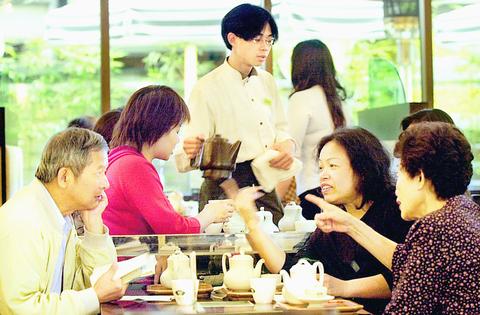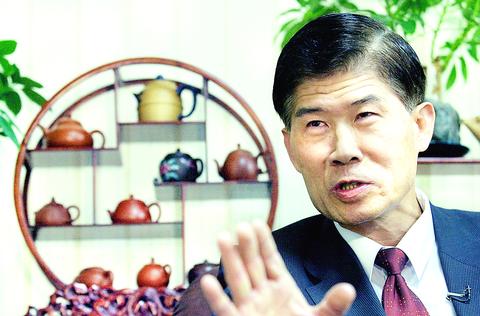While their parents might still follow the age-old tradition of beginning the day with a cup of tea, many young Taiwanese are turning to coffee, as Starbucks shops sprout up across the country.
This worried Lee Shen-chih (李勝治), heir to a century-old tea growing family. So as a counteroffensive, he set up a chain of stores that provide a stylish and cozy environment where customers -- young and old -- can sip a cup of Taiwanese tea.

PHOTO: AP
Much like the US coffee chain, his brightly lit and modern Cha for Tea (喫茶趣) stores are attracting trendy teens and young professionals. Many of his new customers had turned to Starbucks because it was dubbed hip and trendy, while traditional teahouses were considered dark and a place for the elderly.

PHOTO: AP
Li Mei-yan, a fabric saleswoman, likes the feeling of the Chinese teahouse with Western decor at Cha (茶), which means tea in Mandarin.
"This place is like Starbucks, but with a bit more culture," said Li as she chatted with her friend against a glass wall painted with Chinese calligraphy.
There is a light Chinese touch at Cha. At the center of the wooden table is a small plate with a watercolor painting, each illustrating a tea-related poem.
With its chic interiors, Cha is appealing to a young generation more accustomed to Hollywood movies, US and British rock stars and Japanese comic books than things Taiwanese.
The economic slowdown has also helped its business. People are looking for less expensive pastimes as they cut back on shopping for brand-name goods or trips to high-priced karaoke bars.
Sipping tea, office secretary Sandy Chu said she was glad to find an alternative to Starbucks' frothy coffee drinks. "I am learning to appreciate tea. Why not? I am a Taiwanese and should get to know my own culture," she said.
The food served also appeals more to local tastes. The store serves beef noodles, dumplings and cheesecake flavored with tea.
The first four Cha stores -- three in Taipei and one in the central city of Taichung -- were an instant success. Clients line up for a table during the weekends.
The rise of Cha underscores Taiwan's chase of a sense of modernity and the decline of the traditional teahouses.
Besides the Taiwan stores, Lee's Ten Ren Tea Co (
"Tea-making has a 5,000-year history in China," said Lee, Ten Ren's chairman, in his office displayed with an assortment of fist-sized clay tea pots. "Tea is healthy and has a lingering fragrance. I hate to see young people turning their back to it."
He hopes the overseas "Cha for Tea" stores help get Westerners to appreciate tea's flavor and medicinal powers, he said.
Lee is the seventh-generation heir of a Taiwanese farming family whose ancestors brought along 50 seeds of tea when they emigrated from southern China to Taiwan about 200 years ago.
By opening "Cha for Tea" and more overseas tea sales outlets, the Ten Ren Group has recovered from a severe business crisis. It lost NT$3 billion when expanding into securities business a decade ago.
Now the company is focusing on tea again. Ten Ren has 113 retail tea stores, including 64 in Taiwan and 49 overseas.
Lee plans to wait to open Cha for Tea in China because despite the rise of the newly rich, China lacks a middle class who would be the main customers, Lee said.
"China will be a huge market to explore, but it is a bit premature," he said."

Nvidia Corp chief executive officer Jensen Huang (黃仁勳) on Monday introduced the company’s latest supercomputer platform, featuring six new chips made by Taiwan Semiconductor Manufacturing Co (TSMC, 台積電), saying that it is now “in full production.” “If Vera Rubin is going to be in time for this year, it must be in production by now, and so, today I can tell you that Vera Rubin is in full production,” Huang said during his keynote speech at CES in Las Vegas. The rollout of six concurrent chips for Vera Rubin — the company’s next-generation artificial intelligence (AI) computing platform — marks a strategic

REVENUE PERFORMANCE: Cloud and network products, and electronic components saw strong increases, while smart consumer electronics and computing products fell Hon Hai Precision Industry Co (鴻海精密) yesterday posted 26.51 percent quarterly growth in revenue for last quarter to NT$2.6 trillion (US$82.44 billion), the strongest on record for the period and above expectations, but the company forecast a slight revenue dip this quarter due to seasonal factors. On an annual basis, revenue last quarter grew 22.07 percent, the company said. Analysts on average estimated about NT$2.4 trillion increase. Hon Hai, which assembles servers for Nvidia Corp and iPhones for Apple Inc, is expanding its capacity in the US, adding artificial intelligence (AI) server production in Wisconsin and Texas, where it operates established campuses. This

Garment maker Makalot Industrial Co (聚陽) yesterday reported lower-than-expected fourth-quarter revenue of NT$7.93 billion (US$251.44 million), down 9.48 percent from NT$8.76 billion a year earlier. On a quarterly basis, revenue fell 10.83 percent from NT$8.89 billion, company data showed. The figure was also lower than market expectations of NT$8.05 billion, according to data compiled by Yuanta Securities Investment and Consulting Co (元大投顧), which had projected NT$8.22 billion. Makalot’s revenue this quarter would likely increase by a mid-teens percentage as the industry is entering its high season, Yuanta said. Overall, Makalot’s revenue last year totaled NT$34.43 billion, down 3.08 percent from its record NT$35.52

PRECEDENTED TIMES: In news that surely does not shock, AI and tech exports drove a banner for exports last year as Taiwan’s economic growth experienced a flood tide Taiwan’s exports delivered a blockbuster finish to last year with last month’s shipments rising at the second-highest pace on record as demand for artificial intelligence (AI) hardware and advanced computing remained strong, the Ministry of Finance said yesterday. Exports surged 43.4 percent from a year earlier to US$62.48 billion last month, extending growth to 26 consecutive months. Imports climbed 14.9 percent to US$43.04 billion, the second-highest monthly level historically, resulting in a trade surplus of US$19.43 billion — more than double that of the year before. Department of Statistics Director-General Beatrice Tsai (蔡美娜) described the performance as “surprisingly outstanding,” forecasting export growth